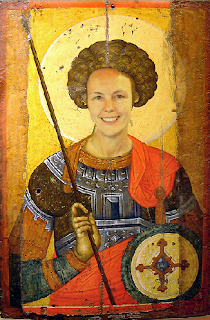Why is it that some schools are able to successfully teach every child to read but the majority still don’t? This was the question posed by Dr Derrie Clark in an interview with Jan Hilary, who was until recently head of St George’s C. of E. Primary School in Wandsworth, when they met at this year’s Reading Reform Foundation conference. You can watch the whole interview here.
St George’s is a school in one of the most disadvantaged areas of the UK. To give you an idea, the school has the highest deprivation indicator in south London. It is also within the 2% of schools that suffer the blight of deprivation nationally and faces ‘all the challenges that children bring from homes that are low on resources’. When Jan took over the headship at St George’s, 76% of the pupils were deemed to have special needs. Today, that number has been reduced to two pupils with statements, meaning that special needs have effectively almost been eliminated.
 |
| Jan Hilary, head teacher extraordinaire! |
Despite the difficulties the school has to overcome, St George’s nursery stage has been awarded ‘centre of excellence’ status and the school has grown to become a national support school. Each year 100% of pupils pass the phonics screening check, demonstrating that, even with the limited resources a one-form entry school has to cope with, the outcomes achieved can still be outstanding. They are outstanding because of the commitment of the staff at all levels and, if you ask them, they’ll tell you that their passion is driven by the fact that they ‘change lives every working day’.
Jan believes that her leadership – she is, by the way, a national leader of education – and success can be attributed to one important factor in particular: as a head teacher, she ‘stays very close to the work of teaching and learning’, something that she says is ‘not typical of school leaders in the UK at the moment’. In fact, when she visits failing schools, she often sees heads undertaking leadership programmes of every kind and yet she finds that they have little or no understanding of teaching and learning.
The secret of successful teaching is to make sure that the leadership team in the school stay close to the classroom. For Jan, teacher training happens through the medium of classroom practice: the experts model the practice they want their apprentices (less experienced teachers) to adopt. ‘Lead through your classrooms!’ is Jan’s watchword.
Neither is Jan an advocate of dawn to dusk free play. Although she recognises the need to provide hours of free play during the early years, she strongly believes that there is plenty of time for structured teaching. And structured teaching means teaching children the right way from the start. Key to this is that children are not expected to work out how to learn by themselves and in the course of so doing to develop poor habits or misconceptions. They are taught how to learn from the moment they enter school.
As part and parcel of the children’s early literacy development, learning how to hold a pencil and how to form letter shapes are all of a piece with the phonics instruction that all children receive from the start. Language development is also a cornerstone of Jan’s approach. Many children arrive with such a ‘paucity of language – just a few word utterances’ in many cases – that the school privileges the practice of clear speaking and she has dubbed St George’s ‘a confident voice school’. In the interview, you can see clearly the pleasure Jan derives from reporting on the three-year-olds at her school: ‘Come into my school’, she tells us, ‘and you will hear every single three-year-old speaking in full sentences that ring out like a tinkling bell’.
Oral language plus clearly structured, Sounds-Write phonics instruction translates into the children’s learning and writing: children learn to write and can write whatever they want to communicate, even if everything isn’t yet spelled correctly. The exciting thing about children producing writing in this way is that they can read what they have written, the teachers can read it and the parents at home can read it too.
What has been a revelation for many visitors to the school from all over the UK is that boys are confident readers and highly motivated writers. This kind of experience flies in the face of the expectations many have of boys’ abilities in the early years. The school now has ‘sensational’ boy readers and writers and, as a corollary of experiencing this kind of success, behavioural issues have all but disappeared.
Reception year is regarded by the school as of critical importance because it is the time in which the one third of children just joining the school for the first time are integrated and caught up to the level of the rest. By the end of reception, all children are ready to learn and, as Jan says, ‘for a school in our context, we are already way over national expectations’.
Jan’s message to other schools is: ‘If we can do it, they can do it!’
*Jan Hilary is now executive head teacher at Floreat Academies and continues to work with St George’s and other schools.
I would like to thank the Reading Reform Foundation for their kind permission to link to the interview with Mrs Hilary.
After visiting Saint George's, I am telling everyone about it, and the wonderful work Jan and her team did there.